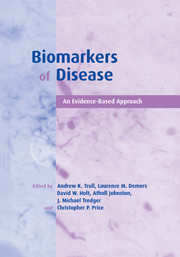Book contents
- Frontmatter
- Contents
- List of contributors
- Preface
- Part 1 Assessing and utilizing the diagnostic or prognostic power of biomarkers
- Part 2 Biomarkers of kidney disease and dysfunction
- Part 3 Biomarkers of bone disease and dysfunction
- Part 4 Biomarkers of liver disease and dysfunction
- 15 Biomarkers of hepatic disease
- 16 The immunogenetics of metabolic liver disease
- 17 Toxicogenetic markers of liver dysfunction
- 18 Prognosis and management of patients with acute liver failure
- 19 Biomarkers in artificial and bioartificial liver support
- 20 Prognostic markers in liver disease
- 21 Apoptosis: biomarkers and the key role of mitochondria
- 22 Liver regeneration: mechanisms and markers
- 23 Determinants of responses to viruses and self in liver disease
- 24 IL-6-type cytokines and signalling in inflammation
- Part 5 Biomarkers of gastrointestinal disease and dysfunction
- Part 6 Biomarkers in toxicology
- Part 7 Biomarkers of cardiovascular disease and dysfunction
- Part 8 Biomarkers of neurological disease and dysfunction
- Part 9 Biomarkers in transplantation
- Index
21 - Apoptosis: biomarkers and the key role of mitochondria
Published online by Cambridge University Press: 20 August 2009
- Frontmatter
- Contents
- List of contributors
- Preface
- Part 1 Assessing and utilizing the diagnostic or prognostic power of biomarkers
- Part 2 Biomarkers of kidney disease and dysfunction
- Part 3 Biomarkers of bone disease and dysfunction
- Part 4 Biomarkers of liver disease and dysfunction
- 15 Biomarkers of hepatic disease
- 16 The immunogenetics of metabolic liver disease
- 17 Toxicogenetic markers of liver dysfunction
- 18 Prognosis and management of patients with acute liver failure
- 19 Biomarkers in artificial and bioartificial liver support
- 20 Prognostic markers in liver disease
- 21 Apoptosis: biomarkers and the key role of mitochondria
- 22 Liver regeneration: mechanisms and markers
- 23 Determinants of responses to viruses and self in liver disease
- 24 IL-6-type cytokines and signalling in inflammation
- Part 5 Biomarkers of gastrointestinal disease and dysfunction
- Part 6 Biomarkers in toxicology
- Part 7 Biomarkers of cardiovascular disease and dysfunction
- Part 8 Biomarkers of neurological disease and dysfunction
- Part 9 Biomarkers in transplantation
- Index
Summary
Introduction
It is now widely recognized that apoptosis is a major pathway for the deletion of aberrant or unwanted cells. For many years, research efforts were targeted at identifying morphological and biochemical features that could be used for distinguishing apoptosis from necrosis. This is not a trivial exercise as secondary necrosis can be induced quite often in the surrounding cells as the result of apoptotic cell death. Nevertheless, distinct phenotypic differences between apoptosis and necrosis can be defined, as shown in Table 21.1. Many of these differences now form the basis of selective bioassay markers for apoptosis.
Significantly, it was originally believed that mitochondria were not involved in apoptosis. This is a view that has changed radically in the last few years as new research has demonstrated that mitochondria play a key role in the execution of stress-induced cell death. Another key development in our understanding has been the recognition that the cell death pathway is genetically conserved from the nematode worm Caenorhabditis elegans to mammals. The C. elegans death gene ced-3 was discovered to be homologous to the mammalian enzyme, interleukin-1β-converting enzyme (ICE), that is now known as caspase-1. Since then, a further 13 caspases have been identified which have different and varying roles in apoptosis and inflammation (see [1] for review). It is now widely accepted that the activation of the caspases is central to the apoptotic process and that mitochondrial factors play an important role in caspase activation.
- Type
- Chapter
- Information
- Biomarkers of DiseaseAn Evidence-Based Approach, pp. 228 - 238Publisher: Cambridge University PressPrint publication year: 2002



